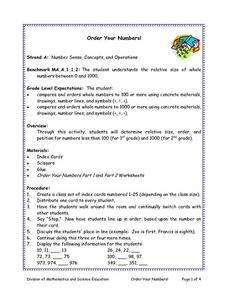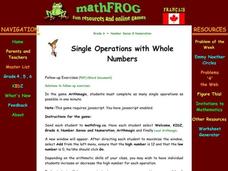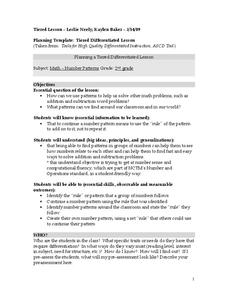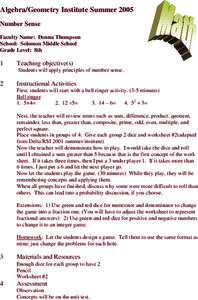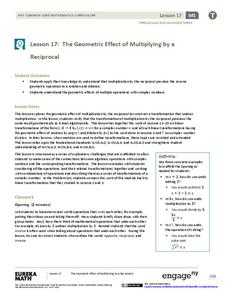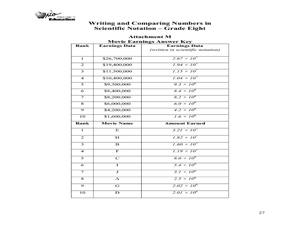Curated OER
Order Your Numbers
Pupils examine the order of whole numbers that range from 0 to 1,000. They compare and contrast the quantities of different numbers using the number line, objects, and symbols of comparison. Students also work as a class with cards to...
Curated OER
Single Operations with Whole Numbers
Sixth graders play the game ArithmAttack, they complete as many single operations as possible in 60 seconds. They go to the Mathfrog website and select ArithmAttack. Students select their high number as 12 and their low number as 0. They...
Curated OER
Ordering Numbers C
In this math worksheet, students order three-digit numbers from the least to greatest. Students also order numbers from greatest to least.
Curated OER
Our Sense Organs And Their Uses
In this sense organs worksheet, students determine facts about our sense organs and their uses. Students write fifteen multiple choice, true and false, and fill in the blank answers.
Curated OER
Ordering Numbers D
In this math worksheet, learners order multiple-digit numbers from the least to greatest. Students also order numbers from greatest to least.
Curated OER
Order of Operations
Sixth graders, while in the computer lab, participate in the Order of Operations game where they must complete as many questions involving two operations as possible in 120 seconds. They review the summary of his/her performance when it...
Curated OER
Number Patterns
Second graders identify number patterns. In this number lesson plan, 2nd graders find the rule or pattern in a group of numbers and continue the pattern using the rule. They create their own number pattern by making their own rule.
Curated OER
Place Value: A Place for Apples
Second graders explore number values by completing math worksheets. In this place value lesson, 2nd graders identify the use of decimals in numbers and read a book about math called Apple Pigs. Students create number charts based on the...
Curated OER
Numeracy
Students review numbers, number systems and the number operations through the use of online webpages.
Curated OER
Equivalent forms of Fractions
Fourth graders use kidspiration software to demonstrate understanding of the concept of equivalent fractions. Using a combination of manipulatives, computer software and writing teachers can easily assess student mastery of number sense.
Curated OER
Linear Systems: Using Matrix Operations
In this linear systems worksheet, students use matrix multiplication as an elimination technique to solve linear systems. They compare products and explore trends. This four-page worksheet contains explanations, examples and five...
Curated OER
Number Sense
Eighth graders participate in a lesson that is concerned with reviewing basic math concepts using the four operations. The activity is composed of a math game that is played by them.
Curated OER
Aboriginal Statistics
Fourth graders analyze statistics of Native Americans by creating graphs. In this data analysis lesson plan, 4th graders define different statistical terms and practice finding those statistics from groups of numerical information...
Curated OER
Prime and Composite Number Mini Lab
Elementary schoolers determine the attributes of prime and composite numbers. Pupils, working in pairs, participate in an activity in which they use manipulatives to show the rectangles that can be made from square tiles. They practice...
Curated OER
Orden De Numeros
Matematica en Espanol. Students who speak, or are learning, Spanish will build their number sense by ordering numbers. They must determine the number that comes before, after, or between the provided examples. Tip: This presentation is...
National Endowment for the Humanities
The House Un-American Activities Committee
Was the House Un-American Activities Committee justified in investigating subversive influences in the entertainment industry? Part two of the three-part series of lessons that examine the anti-communism movement after World War II,...
EngageNY
The Geometric Effect of Multiplying by a Reciprocal
Class members perform complex operations on a plane in the 17th segment in the 32-part series. Learners first verify that multiplication by the reciprocal does the same geometrically as it does algebraically. The class then circles back...
Inside Mathematics
Winning Spinners
Winning a spin game is random chance, right? Pupils create a table to determine the sample space of spinning two spinners. Individuals determine the probability of winning a game and then modify the spinners to increase the probability...
Ohio Department of Education
Writing and Comparing Numbers in Scientific Notation-Grade Eight
Explore scientific notation in this mathematics instructional activity. Young mathematicians explore multiple representations of large number in scientific notation through the use of models, visual representation and expanded form. The...
Curated OER
The Battle for Ultimate Power
Students gain an understanding of how the powers of 10 and scientific notation can be used to represent the scale of things in the universe. They relate the number of stars in the universe to the number of grains of sand on Earth's beaches.
Curated OER
Fun Creative Activities that Teach Math
Students have fun with math. In this math skills instructional activity, students collaborate to solve the problems presented in this interactive instructional activity. The problems pertain to geometry, measurement, probability, number...
Curated OER
Number and Operations: Webbing Our Way Through Numbers
Second graders explore estimation and place value. In this place value lesson, 2nd graders estimate and construct numbers while working with spider activities. Students use addition and subtraction to compare estimates. Resources and...
Curated OER
Addition: Number Bonds to 100
For this addition worksheet, students fill in the missing addend for problems that add up to 100. Students complete 41 problems.
Curated OER
Making Sense of the Answer- Solving Word Problems
In this math problem solving worksheet, learners read each word problem, underline the code words, and write the operation that should be used to solve each problem. They explain their reasoning for choosing the particular operation.


